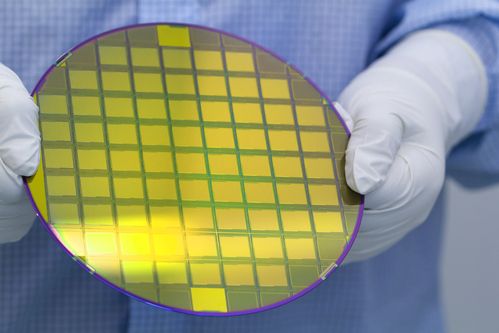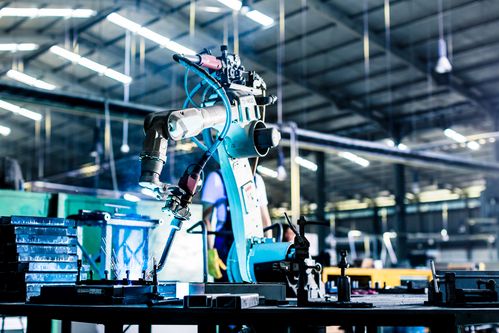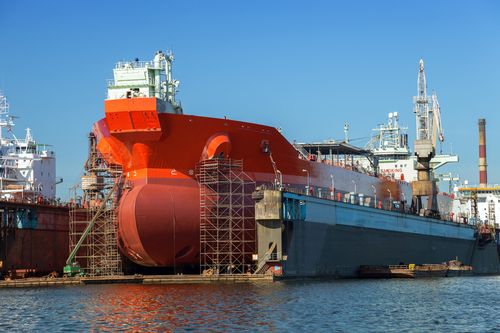South Korea’s Hanwa Group considers entry into semiconductor machinery business
At the beginning of June, the Korea Times had published a corresponding report based on information from the industry. According to the report, Hanwa Group is planning to enter the manufacturing of machinery for the production of computer chips and other semiconductors. The company wants to expand its business model and hopes for synergy effects from its existing production of materials for the manufacture of chips. The focus of the new business unit is to be the production of machines and equipment for coating. In the production of chips, the so-called silicon wafers are coated with an extremely thin layer of certain chemical elements.

Hanwa Corporation is already involved in the production of machines for other industries and hopes to attract more customers with the planned division. Another Hanwa division operating worldwide in the chemical sector produces nitric acid. This is considered a core ingredient in the process of chip coating and wet cleaning. A Hanwa spokesman recently confirmed that the company plans to enter the chip machine business. However, a final decision has yet to be made.
Industry experts see Hanwa’s entry as a good opportunity to advance the company’s growth. Companies around the world are investing in expanding their production capacity due to the shortage of computer chips. Companies from Japan and the U.S. are leading the way in coating machines for semiconductors. According to the Korean Institute of Industrial Trade and Economics (KIET), Japan’s Tokyo Electron and the US’ Applied Materials and Lam Research have a 70 percent market share. In South Korea, medium-sized companies such as Jusung Engineering, Wonik IPS, Eugene Techonology and Tes produce machines for coating chips. KIET estimates that the production competence of Korean companies in this area is 90 percent compared to the market leaders.
South Korea is considered one of the most important and innovative industrial nations in the world. Many products imported to South Korea have to be tested and certified in advance. Many products, such as computer chips, semiconductors and manufacturing equipment, imported into South Korea must be pre-tested and possibly certified with the KC Mark. Korea certification is one of the biggest barriers to entry for products to be imported into Korea.
If you need assistance or have any questions regarding Korean certifications like KC, KC EMC, KCs or KCs for explosion safety products, feel free to contact us any time.
Tel.: +49-69-2713769259
Email: info@korea-certification.com
Urgent questions?
Please do not hesitate to contact us via chat. You will find the chat window at the bottom right of each page (if this is not visible, please check your browser settings).
For more information you can download our free brochure “Korea Certification Made Easy – The Booklet“.
Manufacturing sector props up South Korean economy
The Korean Institute of Industrial Trade and Economics announced the related news on May 5, 2021: South Korea ranks third in the CIP index out of 152 countries, behind Germany and China. The 2018 Competitive Industrial Performance (CIP) Index was released by the United Nations Industrial Development Organization (UNIDO) in July last year. Out of 28 major nations, South Korea ranked second in manufacturing, the institute added. The decline in South Korea’s economic growth last year was only 40 percent of the G7 average. Unemployment went up by only 15 percent compared to the G7 nations.

According to the institute, the South Korean economy did relatively well as exports from the domestic manufacturing industry went up. The Covid 19 pandemic had only a negative impact on local demand for manufactured goods, according to the institute’s evaluations. South Korean companies in semiconductors, displays and petrochemicals are market leaders in their segments and contribute the most to the country’s exports. Many of the manufacturers are well connected in international markets and have corresponding sales opportunities. However, the institute advises that the export market situation should be closely monitored, as there have been recent shifts in buyers due to the trade dispute between China and the United States.
In other news, the OECD recently upgraded its forecast for this year’s South Korean economic growth from 3.3 to 3.8 percent. High foreign demand for IT products, which account for 20 percent of exports, was highlighted here, as well as an increase in the popularity of cars made in South Korea. The Bank of Korea is even more optimistic in its forecast and even sees economic growth of 4.0 percent this year. If this target is achieved, it would be the highest growth rate since 2010.
To import or sell in South Korea, industrial products are subject to KC certification (also known as KC Mark). The KC mark or KC certificate is roughly equivalent to the European CE mark and applies to 730 different products. KC certification, or Korea Certification, is primarily about identifying and containing a potential risk to consumer health and safety. We will be pleased to provide you with non-binding advice regarding Korea Certification and would be happy to carry it out for you.
If you need assistance or have any questions regarding Korean certifications like KC, KC EMC, KCs or KCs for explosion safety products, feel free to contact us any time.
Tel.: +49-69-2713769259
Email: info@korea-certification.com
Urgent questions?
Please do not hesitate to contact us via chat. You will find the chat window at the bottom right of each page (if this is not visible, please check your browser settings).
For more information you can download our free brochure “Korea Certification Made Easy – The Booklet“.
New car sales in Korea up 17 percent year-on-year in January
New car sales in South Korea rose by double digits in January due to extended tax benefits and new models with environmentally friendly engines. The growth is a source of optimism for the Asian country’s auto industry, with many manufacturers hoping for an early recovery after the end of the Covid 19 pandemic. According to the Korean Association of Automobile Manufacturers, a total of 116,550 vehicles were sold in South Korea in January, up 16.6 percent from the same month last year and just as the novel coronavirus was becoming a global pandemic. Current sales are mainly composed of eco-friendly vehicles and SUVs.

Sales of eco-cars increased by more than 82 percent year-on-year as manufacturers launched several new models. Among them were the new hybrid versions of the Hyundai Grandeur, Hyundai Tucson and Kia Sorento. More than 10 percent of all vehicles sold in January were eco-cars. Sales of hybrid-powered vehicles were up 94 percent while electric cars were down 62 percent. This is attributed to an as yet unapproved Korean government subsidy for electric vehicles. Cars with fuel cells gained 75.3 percent, led by the Hyundai Nexo with 140 vehicles sold. All automakers except Renault Samsung Motors Co. reported dramatic increases in domestic sales.
South Korea’s largest automaker, Hyundai Motor Co. reported a 25 percent increase in its sales figures. This was largely contributed by their popular SUV models such as Tucson, Santa Fe and Palisade, as well as the Grandeur and Genesis sedans. Kia Corporation recorded a 12 percent increase due to the rising popularity of its Carnival and Sorento models. Improved production conditions following an agreement with the relevant union in December 2020 also contributed to the better sales figures. Exports of new vehicles are also well on the way to recovery. Exports of new cars from Korea rose 29.5 percent in January from a year earlier. Turnover rose 40.2 percent due to increasing demand for high-end vehicles from South Korea.
Are you interested in the Korean automotive market? Before your products can be launched on the market there, they must undergo certification. MPR International GmbH will be pleased to advise you regarding Korea certification in the automotive sector. We have already successfully assisted many large automotive suppliers and vehicle manufacturers with locations in Korea with their certification projects and have been supporting these companies for several years. Our experts are pleased to answer your questions regarding a pending Korea certification by phone or e-mail.
If you need assistance or have any questions regarding Korean certifications like KC, KC EMC, KCs or KCs for explosion safety products, feel free to contact us any time.
Tel.: +49-69-2713769259
Email: info@korea-certification.com
Urgent questions?
Please do not hesitate to contact us via chat. You will find the chat window at the bottom right of each page (if this is not visible, please check your browser settings).
For more information you can download our free brochure “Korea Certification Made Easy – The Booklet“.
South Korea’s shipbuilders remain global leaders
Consulting firm Clarkson Research reported in early March that orders for 92 new ships were placed globally in the previous month. Of these, South Korean shipbuilders secured 43 orders. These include orders for seven large oil tankers and five A-max tankers. For large container ships with more than 12,000 standard containers (TEU), South Korean companies won 13 of 17 tenders. Chinese and Japanese shipbuilders follow in second and third place on the world market.

The gap in market share between South Korea and China increased by 16 percent to 56 percent in February, while China gained only one percentage point from 39 to 40. In compensated gross tonnage (CGT), South Korean companies gained 2.5 million CGT in the first two months of the year while China and Japan remained unchanged at 1.9 million CGT and 0.32 million CGT, respectively.
In the same period, Korea Shipbuilding & Offshore Engineering won orders for 46 vessels worth US$3.7 billion. This already represents a quarter of the company’s target for this year. Samsung Heavy Industries received orders for 31 vessels worth US$2.4 billion, securing as much as 31 percent of its target for the year. Daewoo Shipbuilding & Marine Engineering was awarded orders for 6 new vessels worth US$600 million, reaching 8 percent of its 2021 target.
Current backlog of open orders worldwide increased by 780,000 CGT to 71.06 million CGT in February. Broken down into the top 3, China accounted for 25.7 million CGT, South Korea 22.47 and Japan 7.97 million CGT. The Clarkson Newbuilding Price Index increased by one index point to 128 points in February. This was the third consecutive month that the indicator rose.
South Korea is considered one of the most important and innovative industrialized nations in the world. In order to gain market access to this highly technological country, products imported into South Korea must be tested and certified. The KC mark or KC certificate is roughly equivalent to the European CE mark and applies to 730 different products. MPR International GmbH has solid experience in Korea certification and competent local partners.
If you need assistance or have any questions regarding Korean certifications like KC, KC EMC, KCs or KCs for explosion safety products, feel free to contact us any time.
Tel.: +49-69-2713769259
Email: info@korea-certification.com
Urgent questions?
Please do not hesitate to contact us via chat. You will find the chat window at the bottom right of each page (if this is not visible, please check your browser settings).
For more information you can download our free brochure “Korea Certification Made Easy – The Booklet“.



